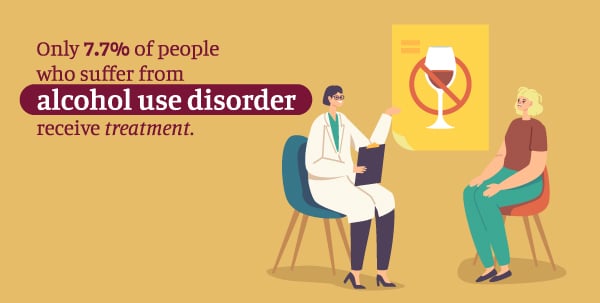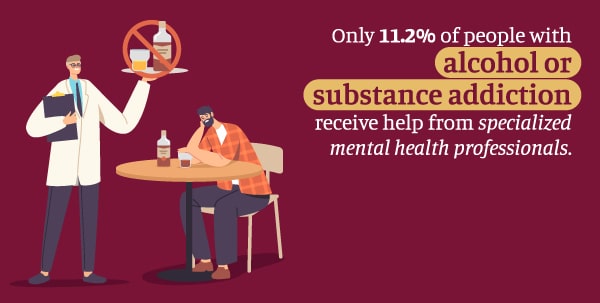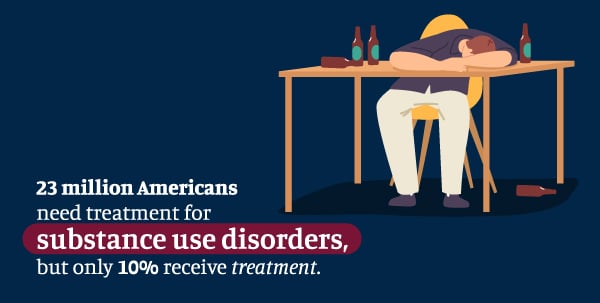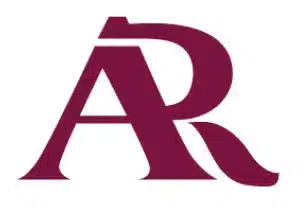Ohio Alcohol & Drug Rehab Residential Inpatient Treatment Centers

Ohio Alcohol & Drug Rehab Residential Inpatient Treatment Centers
Table of Contents
What Is an Inpatient Rehab Center?
Residential drug rehab, also known as an inpatient treatment center, is an intensive rehabilitation program designed to work with substance abuse disorders and addiction. Inpatient rehabs generally require clients to check in the rehabilitation center for around-the-clock emotional support, therapy, and medical assistance.
The environment within a residential drug rehab center is designed to be a safe and supportive community that fosters healing and recovery from addiction. While attending an inpatient drug rehab, the client may undergo detoxification, work with psychologists, psychiatrists, or mental health professionals, and learn ways to cope with their addiction.
A Look into Inpatient Care
Factors to Consider When Deciding Alcohol Inpatient Treatment
When considering residential rehabilitation treatment programs, there are some factors to consider as clients look for the right fit. Residential drug rehab centers can offer different treatment programs and may be a better fit depending on one’s medical history, substance use, mental health, and age.
Medical History
Medical history is something that everyone should consider as they’re looking for a residential rehabilitation treatment program. Because one’s medical history can influence medications and treatments, it’s important to consider past experiences when looking for a new treatment center.
Substance Use
Some programs may be better suited to help individuals overcome certain substances. While most programs will treat both drugs and alcohol addictions, potential clients should look at the treatment options and programs that each inpatient treatment center offers.
Mental Health
Many programs will treat both addiction and mental health disorders. Using these dual diagnosis models, those looking for quality rehabilitation and addiction treatment should look for programs that are strong in both mental health and addiction treatment.
Age
Age can also play a significant role in deciding on a treatment center. Some programs may be better suited to work with a younger population, older population, men, women, or veterans.
What Can Residential Drug Treatment Offer?

Rehabilitation centers for drug addicts and those who suffer from addiction can offer several treatment programs. When deciding if inpatient drug rehab is the correct choice for you or your loved one, it’s important to consider everything that a treatment plan has to offer. For instance, some important questions to answer include:
- What kind of treatment does the program offer? Many programs offer different options for treatment, including inpatient and outpatient.
- Is the treatment designed to meet individual needs? Treatment rehab centers that tailor interventions and treatments to the individual are better for the individual’s success.
- What is expected of the client who attends the inpatient treatment center? It’s important to understand what the client will be expected to do in treatment to ensure that it’s the right option for their situation.
- How is success measured? Some inpatient rehabs measure success differently, so it’s important to understand how individual treatment centers track progress over time.
- How does this residential drug rehab handle relapse? Relapse is a part of recovery. When looking for an inpatient drug rehab, make sure to look at how they handle instances of relapse.1
Medical Detox
Detoxification is the period where an individual removes all traces of the substance from their body. It involves clearing all toxins out of the client’s body and, without proper intervention, can be an uncomfortable process. While several interventions can help manage the detox period, successful interventions often use medication-assisted treatment for detoxification.2
Some of the common medications used to assist in successful detoxification include:
- Bunavail (buprenorphine and naloxone)
- Cassipa (buprenorphine and naloxone)
- Probuphine (buprenorphine)
- Sublocade (buprenorphine extended‐release)
- Suboxone (buprenorphine and naloxone)
- Subutex (buprenorphine)
- Zubsolv (buprenorphine and naloxone)3
Individual Therapy
Individual therapy is an essential part of the recovery process. While working with a mental health professional, those undergoing individual therapy will learn the coping skills necessary to manage their addiction and better understand themselves through therapeutic treatment.
For example, research-based therapeutic models, including the Matrix model, cognitive behavioral therapy, solution focus therapy, and dialectical behavioral therapy are used to find a treatment plan that best works for the individual client.4
Medication Management
If an individual decides to use medication-assisted treatment, medication management becomes part of the individual’s therapy. The professionals working in inpatient drug treatment programs will ensure that all medications are given at the appropriate dosage and at the correct time.
Family or Couples Counseling
Family, couples, and marriage therapy can be used in inpatient rehab for drugs. If an individual decides that this type of counseling is the route for them, family members and partners will be invited to two therapy sessions to evaluate their relationships and learn to cope with issues as a group instead of only individually. Typically, couples counseling or family counseling does incorporate individual sessions, but group therapy sessions can be beneficial.5
Residential vs. Inpatient Rehab: What’s the Difference?

While many people will use residential drug rehab and inpatient drug rehab interchangeably, they’re two different forms of addiction treatments. Whereas inpatient drug rehab is generally used to describe voluntary or involuntary hospitalization for substance use disorder, residential drug rehab is a more specialized environment that allows clients to access evidence-based therapies and high-quality resources.
Clients will spend their days and nights in the inpatient treatment center within residential drug rehab and inpatient drug rehab. Additionally, drug and alcohol rehab centers that offer a residential program allow clients to attend individual and group therapy.
Customizable Treatment Options
By attending a residential rehab center, clients will have access to customized care perfectly tailored to their needs. Because each individual presents unique problems, it’s essential to have a treatment plan that is as unique as the individual. Thus, inpatient rehabs that offer residential care are incredibly customizable. Additionally, residential rehab centers use a variety of treatment options, including holistic, psychological, and experiential treatments.
Residential Rehab Centers
Whereas typical rehabilitation centers for drugs and alcohol are generally located in a hospital, residential drug rehab often takes place in a resort-like location. For instance, many residential drug rehab centers will have pools, gyms, hot tubs, game rooms, and a serene environment that promotes healing.
Lower Staff-to-Client Ratio
Drug rehab facilities that offer inpatient services are often limited to hospital staff. This means that the hospital can only take in as many clients as their limited staff allows, and the staff may not be as trained in mental health services. However, residential rehabilitation treatment programs focus only on overcoming addiction, so their staff are experts in addiction treatment.How Much Does Residential Rehab Cost?
The cost of residential drug rehab will depend on several different factors. Drug and alcohol rehab centers often differ in size, location, type of treatments. Residential drug rehab centers may have different costs depending on the following:
- Type of facility. For example, inpatient, residential, outpatient, or partial outpatient.
- Location of the facility. Facilities may be near an individual’s home, in the mountains, near the beach, or outside larger cities.
- Size of the program. While some programs allow for large numbers of clients, others keep their clientele small for a more intimate inpatient treatment center.
- The length of the program. Inpatient treatment lengths vary between 30 and 90 days, depending on individual needs.
- The different amenities offered. The residential drug rehab programs that offer more amenities, such as swimming pools, on-site gyms, massage therapy, dietary counseling, and others, may be more expensive.
Typically, the cost of rehabilitation centers for drugs and alcohol is between $14,000 and $27,000 for a 30-day program. Outpatient treatment programs can range from free sessions to $500 per session. Further, detoxification can cost anywhere from $600 to $1000 each day, depending on the location and program.
Financial Assistance
Because the price of residential drug rehab can seem steep, it may be helpful to know the organizations that offer financial assistance for rehab. No individual should avoid treatment because they’re afraid of the cost of rehab. Even if an individual has health insurance that covers most rehab costs, even paying for co-pays and deductibles can seem intimidating. The following are some organizations that offer grants and financial assistance for attending residential rehabilitation treatment programs:
Substance Abuse and Mental Health Services Administration (SAMHSA) grants:
- Medicare
- Medicaid
- The Affordable Care Act (ACA)
- U.S. Department of Veterans Affairs
Advantages Of Inpatient Rehab

There are many advantages of attending residential drug rehab. Not only does the residential treatment center offer a safe and comfortable environment, but it’s an oasis away from outside triggers and distractions. Residential treatment centers also create a community where peer support becomes an integral part of recovery.
While it may seem intimidating to leave home and live at a treatment center for a long time, inpatient rehab has many benefits. Some of the most common benefits of attending a residential drug rehab program include:
- A safe environment that promotes recovery.
- Peer support that can create a community of healing.
- Use of the highest quality evidence-based interventions for addiction recovery.
- Daily routines and planned activities.
- Access to mental health professionals who are trained in addiction therapy.
- Around-the-clock support and assistance.
- Relapse prevention and aftercare plans.
- Privacy from friends and family.
Being in a Safe, Comfortable Environment
By entering an inpatient rehabilitation center, clients can feel comfortable in a safe environment that supports recovery. One of the main differences between a residential treatment center and an inpatient program is that the residential treatment center is more likely to be in a resort-like location. Clients have access to all the amenities they need.6
Those who attend a residential treatment center can find themselves in a comfortable environment that offers a range of amenities that make their lives in treatment like home. Further, safety is paramount in the treatment of substance use disorders. For individuals to feel comfortable opening up and talking about their experiences, they need to feel physically and psychologically safe.
Freedom from Outside Triggers, Distractions
Triggers are any stimulus that elicits a reaction out of a person. A trigger can be anything and can become incredibly difficult to deal with. Addiction is connected to triggers within one’s environment and stressful situations. For that reason, staying at a residential drug rehab center can be beneficial.7
While at the residential treatment center, the individual will be part of an environment that limits distractions and helps the client avoid their triggers as they learn better ways to cope with addiction. Along with escaping from triggers that may be prevalent in the outside world, being in a residential treatment center and attending therapy can help individuals recognize their triggers and learn how to cope with them appropriately.
Being Surrounded by a Support System of Fellow Patients
Peer support is an instance of giving and receiving nonprofessional and non-clinical assistance from individuals who have similar conditions or lived through similar circumstances. Peer support can be an essential aspect of addictions recovery.8 Within a residential treatment facility, clients will have the company of each other and will be able to work together to journey on their road to recovery.
Understanding Patient-Centered Care
Which Inpatient Treatment Length is Best for Me?
- A formal intake or assessment.
- Customizable treatment plans.
- Medical detox or detoxification.
- Depending on an individual’s needs, various interventions — such as medically assisted treatment, family counseling, peer support group, skills training, and relapse prevention.9
30-Day Residential Inpatient Treatment
The most common residential inpatient treatment is a 28-to-30-day program. These month-long programs generally start with an intake evaluation and an individualized treatment plan. Typically, clients can expect assistance with withdrawal and an aftercare plan. While this shorter treatment plan may be sufficient for some, it’s not always the answer for everyone.
60-Day Residential Inpatient Treatment
60-day residential treatment programs offer similar treatments to 30-day programs, but they have twice as much time for treatment. Instead of only partaking in intake, withdrawal, and aftercare, 60-day programs typically have a more intense therapy component. These longer programs allow clients to spend more time focusing on the implications of their substance abuse disorder, recovery, and triggers. Further, clients will get a chance to practice better-coping skills, build better support networks, and have more time to prepare for their coping after their treatment has been completed.
90-Day Residential Inpatient Treatment
90-day residential treatment programs are the longest that is generally offered. Further, these longer programs typically have more success because those who partake in them undergo more intensive therapy and have more time to work on their addictions.10 90-day programs include intake, therapies, and aftercare plans, but they’re generally much more intensive and last longer.
These longer programs are also better for individuals who have experienced relapse more than once and those who have co-occurring mental health disorders. Those who undergo a 90-day treatment plan have more access to psychological support and have more time to fine-tune their healthy coping mechanisms.
How to Find the Best Inpatient Drug Rehab Near Me

Recovery with Arrow Passage
Arrow Passage is an inpatient treatment center located in Massillon, Ohio. Our professionals incorporate dual diagnosis treatment models that maintain the highest quality care for every client. Mental health experts at Arrow Passage utilize personalized treatment plans that are altered based on individual needs. Further, our integrated approach provides comprehensive support to help you succeed in the recovery process.
Searching for a Drug Rehab Center? Contact Us
Our mental health experts design a personalized treatment plan to help you or your loved one overcome their addiction. If you or your loved one are looking for addiction treatment, contact Arrow Passage’s professionals today.
Resources
- https://www.niaaa.nih.gov/publications/brochures-and-fact-sheets/treatment-alcohol-problems-finding-and-getting-help
- https://www.ncbi.nlm.nih.gov/books/NBK64119/
- https://www.fda.gov/drugs/information-drug-class/information-about-medication-assisted-treatment-mat
- https://nida.nih.gov/sites/default/files/podat_1.pdf
- https://www.aamft.org/
- https://www.ncbi.nlm.nih.gov/pmc/articles/PMC6543154/
- https://www.ncbi.nlm.nih.gov/pmc/articles/PMC7186308/
- https://www.ncbi.nlm.nih.gov/pmc/articles/PMC5047716/
- https://www.samhsa.gov/find-help/treatment
- https://www.ncbi.nlm.nih.gov/pmc/articles/PMC1852519/















